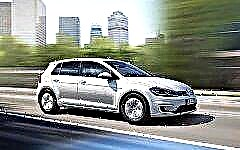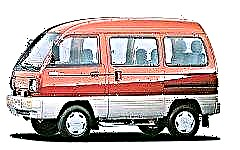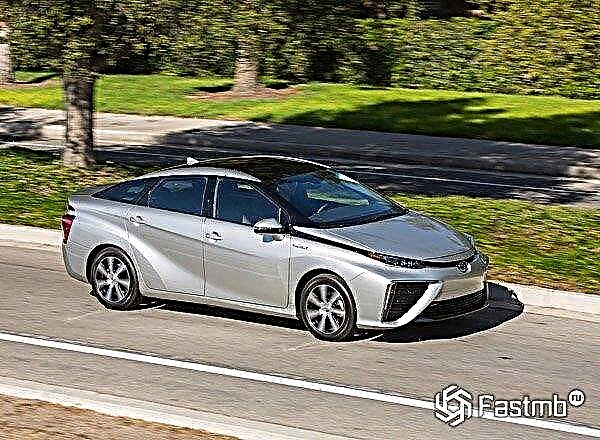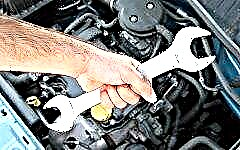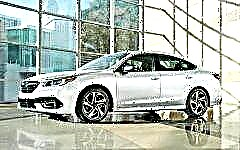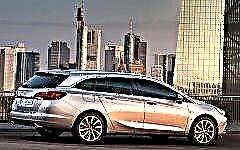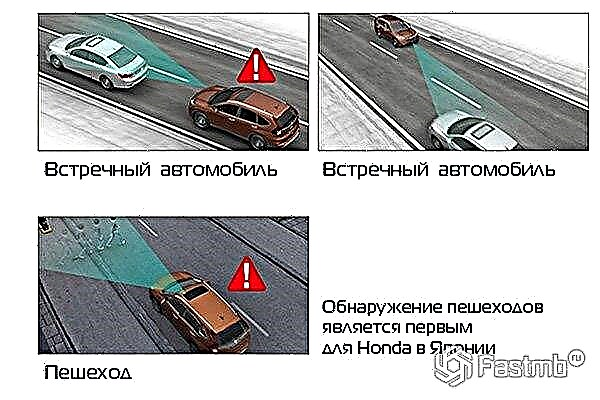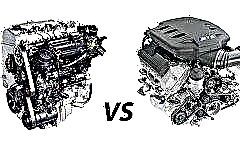

The content of the article:
- Sales statistics
- Diesel or gasoline - comparison of basic parameters
- Advantages and disadvantages of each type of engine
- Diesel
- Petrol engine
For several decades, car owners around the world have been incessant disputes about which engine is better - gasoline or diesel, and each of the parties has a whole set of arguments proving that it is their type of power plant that is the best.
But if you try to grasp the essence of the issue, it turns out that everything is not as obvious as it seems at first glance, since each of the motors has a number of unique properties and features, as well as advantages and disadvantages. Moreover, a diesel engine has nothing to do with gasoline engines, and what they have in common is the name - "engine" and several main components and assemblies. Everything else for motors is different, and this applies not only to the technical part, but also to the principle of operation, maintenance cost and maximum service life.
That is why we will not add fuel to the fire, but will try to highlight the main points that will help car owners choose the best option for themselves, based on their personal needs and vehicle operating conditions.
Sales statistics

Before proceeding to a direct comparison and determination of the advantages and disadvantages of each type of engine, let's look at the statistics of sales of cars using diesel and gasoline engines for driving.
So, of all cars sold on the domestic market, about 7% are equipped with diesel engines, another 2% are cars with electric or hybrid engines, and the remaining 91% are cars that use a gasoline engine.
First of all, this is due to the fact that the starting price of diesel cars is noticeably higher than the cost of their gasoline counterparts. For example, let's take one of the best-selling off-road vehicles in Russia - the Renault Duster model in the "Expression" configuration, the minimum price of which with a gasoline engine and all-wheel drive starts at 845 thousand rubles, while the minimum cost of a car with a similar transmission, but the diesel engine is already 934 thousand rubles. Do you feel the difference?
Secondly, the range of gasoline vehicles on the Russian market significantly exceeds that of vehicles using a diesel engine. The reason for this, according to the automakers themselves, is the low quality of domestic diesel fuel, which threatens with expensive repairs and an early failure of diesel engines. As a result, the culture of owning diesel engines simply has nowhere to appear.
However, in all fairness, we note that automakers are gradually expanding their lineup with diesel versions of popular models, as their demand in Russia is gradually increasing.
Diesel or gasoline - comparison of basic parameters

Considering the question of which gasoline or diesel engine to choose, we will conduct a direct comparison of their main parameters:
- Power and torque. If we take two engines of similar displacement, then in most cases the type of engine gasoline will produce more horsepower, while the torque will always be more from a diesel engine. Therefore, if acceleration is important to you, and the carrying capacity parameter plays a secondary role, then a car with a gasoline power unit will be the best choice, and vice versa.
- Profitability. One liter of diesel fuel contains more energy than one liter of gasoline, as a result, diesel engines have a higher efficiency per liter of fuel burned, which makes them more efficient.
- The amount of noise and vibration. Despite the fact that automakers have taken a huge step forward in recent years, diesel engines are still noisier and jarring than their gasoline counterparts. This is especially striking at idle and acceleration.
- Cold weather start. Everyone who has ever encountered diesel engines knows that starting the engine at temperatures below 30 degrees is another task. True, this applies to conventional diesel engines, since their more advanced and expensive modifications are specially equipped with glow plugs, more powerful starters and batteries, as well as special heating elements designed to maintain the required temperature in the engine block. Gasoline engines look more advantageous, as starting problems are often observed only at temperatures below 40 degrees.
- Maintenance cost. Answering the question which diesel or gasoline is better, one cannot fail to note such a parameter as the cost of short-term and long-term service. So, short-term maintenance of a diesel engine costs an order of magnitude more, the reason for which is the presence of more oil in the engine, which requires more frequent replacement of filters and gaskets. But the cost of long-term maintenance of a diesel engine is noticeably lower, since it has a higher durability and, accordingly, it will need major repairs much later.
- Fuel price. A few years ago, the price of diesel fuel was noticeably lower than the cost of gasoline, so the conclusion was obvious. Now the cost of diesel fuel is as close as possible to the price of gasoline, and in some cases even exceeds it, due to which the difference between diesel and gasoline has become not so obvious.
Advantages and disadvantages of each type of engine
Having dealt with the difference in the main parameters, you can summarize and disassemble the main advantages and disadvantages of each type of engine.
Diesel engine - pros and cons

Dignity
- Low fuel consumption. No matter how economical modern gasoline engines are, in terms of fuel consumption they will be inferior to diesel engines for a long time, which have greater efficiency and provide a higher torque.
- Less transport tax. Since diesel engines, with comparable characteristics, have less power, the value of the transport tax for them is an order of magnitude lower.
- Environmental friendliness. It will not be a secret to anyone that diesels are more environmentally friendly than gasoline engines, yielding in this parameter only to hybrids and electric cars.
- Durability. Modern gasoline engines need to travel from 150 to 200 thousand km before they need overhaul, while for a diesel engine this value is at least twice as large, which indicates their greater durability and reliability.
Disadvantages
- Higher demand for fuel quality, which is especially important in the context of Russian realities. If you fill a diesel engine with low-quality fuel, then it will very soon require repairs, which, in comparison with a gasoline engine, will cost a more round sum.
- Problems with starting the engine at low temperatures are possible.
- Longer warm-up, so when driving in winter, you need to be prepared for the fact that life-giving warmth will appear in the car's interior only after a few kilometers.
- The higher cost of maintenance, and the number of car services serving diesel engines, is noticeably lower than similar ones for gasoline engines. True, if we scatter the cost of repair and maintenance over a longer service life of a diesel engine, then the savings on a gasoline engine will not look so significant.
- A noticeably higher starting price of a car with a diesel engine, which can reach 10-20% in comparison with a similar gasoline car.
Gasoline engine - pros and cons

Dignity
- Simplicity of design and prevalence. A gasoline engine has a simpler design than a diesel engine, and is more common in Russia, which allows repair and adjustment in almost any car service center.
- Confident launch in virtually all weather conditions. If the engine has no malfunctions, it will not be difficult to start it even at temperatures below 40 degrees Celsius, while with a diesel engine, under comparable conditions, there may be problems with starting.
- Affordable price. Cars with gasoline internal combustion engines will cost significantly less than their diesel counterparts, however, this rule does not apply to used cars.
- A wider selection of complete sets, and this applies to almost every automaker represented in Russia.
Disadvantages
- Frequent problems with the ignition system. Compared to diesel engines, the ignition system in gasoline engines often fails, which promises additional and more regular material costs.
- Low operating ranges. To get the most out of the gasoline engine, you have to turn it long and hard, while the diesel has maximum output, practically from idle.
- Profitability. As we have already said, no matter how modern a gasoline engine is, its consumption will still exceed that of a diesel engine.
As a result, it is necessary to choose the type of engine based on the operating conditions, as well as driving style, so if you like to accelerate quickly, do not plan to transport heavy loads and do not use the car for commercial purposes, a car with a gasoline engine is more suitable. Otherwise, it is better to choose a diesel engine.

